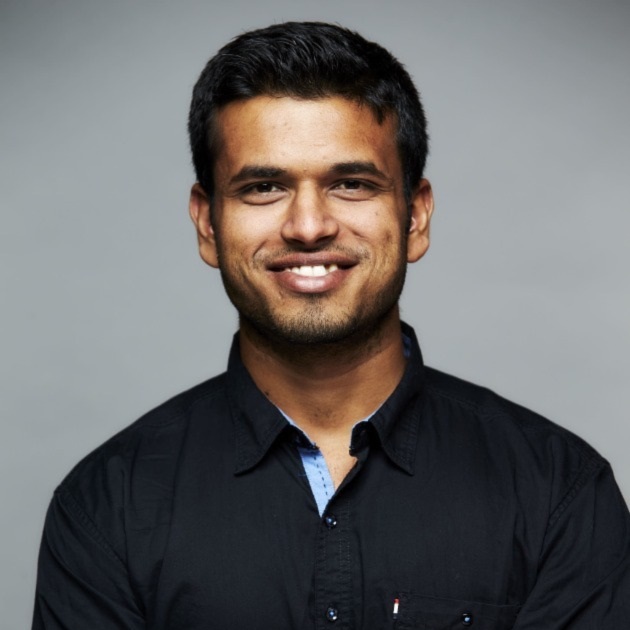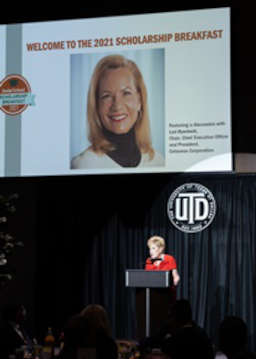
Communications, engagement and inclusion are the main focuses a corporate leader — male or female — should have for a company to be successful in both challenging and successful times, Celanese Corporation CEO Lori Ryerkerk said at a recent Naveen Jindal School of Management signature event.
“I believe that the most successful leaders are those that take the challenges and turn them into opportunities,” Ryerkerk said. “It’s an opportunity to show compassion. It’s an opportunity to express your appreciation to those who do the real work.”
Ryerkerk, who is also board chair and president at Celanese, a global technology and specialty materials company headquartered in Irving, Texas, spoke at the 2021 Scholarship Breakfast, the Jindal School’s annual major fundraiser, held Nov. 17 at the Davidson-Gundy Alumni Center.
The event drew an audience of 220, and it raised more than $100,000, enough to fund more scholarships than ever before. Since its inception in 2009, the annual event has raised more than $1 million.
‘The Skills That Define a Great Leader’
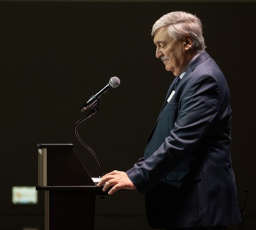
Prior to introducing Ryerkerk, Dr. Hasan Pirkul, Caruth Chair and Jindal School dean, provided the audience with a State-of-the-Jindal-School address. Pirkul, who joined UT Dallas as the Jindal School dean in 1996, is one of the longest tenured deans of any U.S. business or management schools. His remarks included an assessment of the effects that the COVID-19 pandemic had on school operations.
“We really did not suffer through this,” Pirkul said. “In fact, I can say we thrived through it because today we have record enrollments, record freshman enrollment this fall [and] almost record graduate student enrollment this fall.”
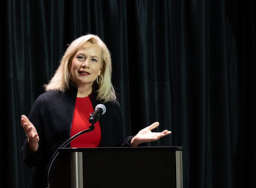
Ryerkerk — one of only 33 female chief executives at a Fortune 500 company and D CEO magazine’s CEO of the Year in 2020 — described her nearly four-decades-long career. As a female in a male-dominated energy industry, she rose through the ranks after starting as a chemical engineer. Along the way, she had to lead employees through multiple natural disasters, including hurricanes and two pandemics — the SARS outbreak in the early 21st century and COVID-19.
She said that what she has learned in that time is that communications, engagement and inclusion are the traits that make a leader most effective because they offer opportunities to build excitement about the future of a company.
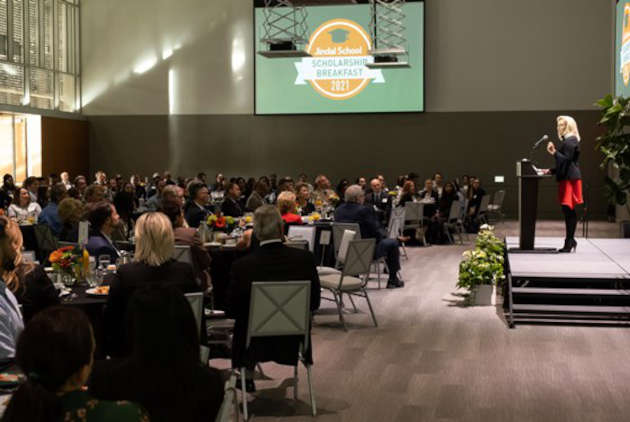
“These are not soft skills,” Ryerkerk said. “These are not feminine skills. These are not nice-to-have skills of a good leader. These are the skills that define a great leader, because when all the employees feel that excitement, that passion, they share that common goal and feel like they are valued; that’s when we win.”
Prior to entering the workforce, Ryerkerk said, she did not envision herself as a CEO. She said she would have been happy to be a chemical engineer for her entire career.
“I had so many opportunities, and I was forced into them,” she said. “And that’s what helped me grow.”
Her advice, she said, “is take risk. Learn how to take … calculated risks — risk for people, not risk for safety — but take risk, show results and be willing to take that hard assignment.”
Student Expresses Gratitude
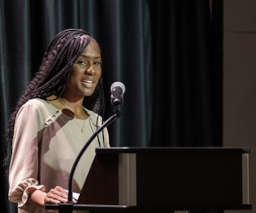
Reign Johnson, an information technology and systems junior at the Jindal School, spoke briefly about how being a scholarship recipient has positively affected her student experience at UT Dallas.
In addition to her coursework, Johnson said she is active in many clubs and student organizations. “I am able to be a part of all these enriching organizations due to scholarships,” she said. “I am so happy to have this opportunity to thank all of the donors on behalf of the recipients. Thank you so much.”
Generosity Helps Fulfill Visions
Johnson introduced Dr. Rafael Martín, vice president and chief of staff of The University of Texas at Dallas. Martín, himself a scholarship recipient, thanked the donors for their generosity and described how the venue for the breakfast — the Davidson-Gundy Alumni Center — had been a COVID-19 vaccination site in which 49,000 doses had been administered. Funds to build it were donated by JSOM alumni Nancy Gundy Davidson, BS’80, and Chuck Davidson, MS’80.
“It shows that when people like the Davidsons are generous and have some vision for a facility like this, you never know what’s going to come out of it,” Martín said. “It’s part of a tradition of leaders of our University that have shown vision — starting, of course, with our founders, Eugene McDermott, Eric Johnson, Cecil Green … the founders of this institution that really envisioned a university that would train top talent and serve North Texas through research, education and cultural programs. … I think we’re well on our way to fulfilling that vision.”
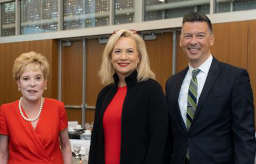
Dr. Diane McNulty, associate dean for external relations, communications and corporate development at the Jindal School, emceed the event. She explained that the previous year’s breakfast necessarily had gone virtual because of the COVID-19 pandemic. Even so, the event won the Jindal School’s External Relations team the 2021 Event Marketing of the Year Award from the Dallas/Fort Worth chapter of the American Marketing Association.
“Our team did an outstanding job despite the challenges of the pandemic,” McNulty said. “Our donors and sponsors rose to the occasion and the results were more financial support for our students when they needed it the most.”
The Beck Group, Deloitte and Lennox were presenting sponsors of the breakfast this year. Altair Global, Blue Cross and Blue Shield of Texas, Capital One, Fujitsu, Goldman Sachs, Dr. Sydney Smith Hicks, HM&M, Home Light, Intuit, Jindal School Executive Education, Intuit, Merit Energy Company, Palomino Capital, Amber Rao, Retail & Restaurant Growth Capital, Riveron, Texas Instruments, TFOA, Toyota and Vistra also sponsored the event.




